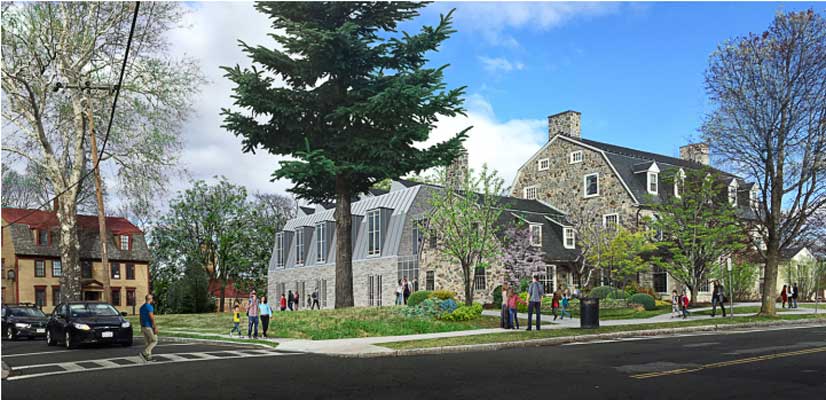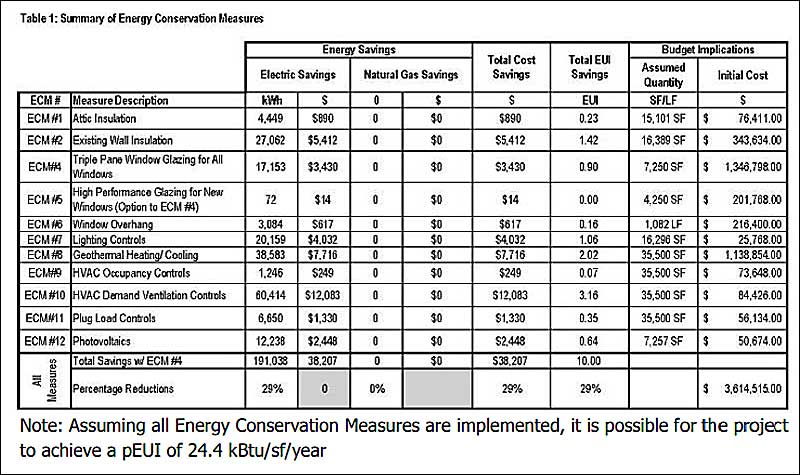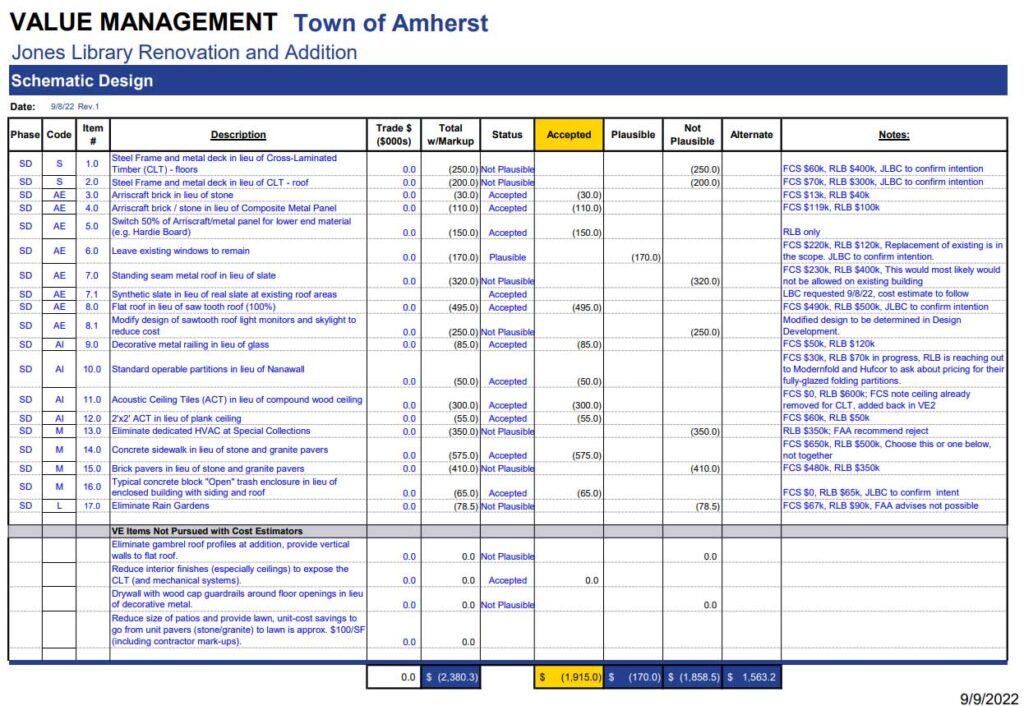Jones Library Project Backpedals On Sustainability Commitment

Photo: https://www.joneslibrary.org/
Superlative Climate-friendliness Claims Are Exaggerated
In an effort to attract tax and grant money for a demolition-expansion-renovation project now budgeted at $46.1 million, the Jones Library Capital Campaign has long touted sustainability features included in the design.
Local news outlets and both U.S. Senator Ed Markey and U.S. Congressman Jim McGovern have described the proposed Jones Library renovation as producing “one of the most climate-friendly libraries in Massachusetts” in justifying a $1.1 million federal earmark for the project. Newspaper reports have proclaimed that the rebuilt library will be “net zero energy.”
A closer look at green development efforts across the state and Jones Library design plans shows that the “most climate-friendly” claim is dubious, and the “net zero” label is false.
Net Zero Ready, But Not Net Zero
A net zero building, according to the National Institute of Building Studies, is one that produces enough renewable energy to meet its annual energy consumption.
In November 2017, Amherst Town Meeting passed a bylaw requiring all new municipal building projects to meet net zero energy standards. The recently funded Fort River Elementary School project will be the first building to comply.
Though initially requiring a $36.3 million borrowing authorization by the town, Jones Library renovation proponents argued that the project was started before the net zero bylaw was passed, and so was exempt from its requirements. The library trustees did, however, recognize the importance of reducing greenhouse gas emissions and formed a sustainability committee that proposed adopting a dozen Energy Conservation Measures (ECMs) at a cost of $3.6 million.

As project cost estimates ballooned to nearly $50 million, ECMs began to fall by the wayside. Geothermal heating/cooling and photovoltaics were eliminated. Currently a more efficient all-electric HVAC system is budgeted but there are no plans to generate energy on-site. The all-electric power design enables the possibility for the building to become net zero should the library be able to add on-site power generation or purchase off-site renewable energy. I.e., the new building will be “net zero ready” but not “net zero.”
See related Anne Perkins: Demand a carbon neutral library (Daily Hampshire Gazette)
Library Opts Not To Pursue LEED Certification
The Massachusetts Board of Library Commissioners (MBLC), the state agency that awarded the Jones Library a $13.8 million construction grant, offers a Green Library Incentive program that allows a construction grant to be increased by 2.0% – 3.5% if it achieves a level of LEED (Leadership in Energy and Environmental Design) certification.
Four levels of LEED certification are offered – Certified, Silver, Gold and Platinum – with the program administered by the Green Building Certification Institute. Qualifying at the platinum level would allow the Jones Library project to receive an additional 3.5% from the MBLC, or roughly $480,000. In September 2020 library trustees reported the building project would not pursue LEED certification, explaining:
“It is important to note that while LEED certification was, at one point, an important step in the world’s sustainability efforts, focusing on actual performance is much more important than spending time and tax-payer money on LEED certification documentation.”
In a list of 14 current grant-funded library construction projects in Massachusetts, the MBLC reports that at least 8 have achieved LEED certification. UMass reports 20 building projects that have attained or are targeting LEED certification. Boston reports at least 44 buildings that have received the platinum level distinction.
See related John Janardhanan: Seeks to correct record on Jones Library project (Daily Hampshire Gazette)
Value Engineering Takes Its Toll
Further eroding initial goals of the library’s sustainability committee have been design decisions that have resulted from a “value engineering” exercise to reduce project costs.

Cost reductions were achieved by replacing natural materials possessing a low embodied carbon measurement with synthetic options. Acoustic ceiling tiles are replacing compound wood ceilings. Brick pavers will be used instead of stone and granite pavers. Synthetic slate has been chosen as a roofing material rather than the real slate used on the historic portion of the building.
A saw-toothed roof area with skylights designed to let in ample natural light similar to the current atrium has been cut to save money. An additional benefit of a saw-toothed roof is that it provides raised surfaces on which solar panels may be mounted.
Triple-glazed windows, included in a previous design that led to an expected Energy Use Intensity (EUI) measurement of 29, are reportedly no longer contemplated.
Earlier this year Finegold Alexander Architects (FAA) announced that the use of Cross Laminated Timber throughout the building would not be possible due to earthquake codes, and some steel support will be required.
The Jones Library Capital Campaign is relying on sustainability features to qualify for $220,500 in MassSave EUI incentives. It will not be known to what extent the value engineering cuts have degraded the planned building’s EUI until FAA is able to generate a Whole Building Lifecycle Assessment based on the updated design.
Evading The New State Energy Code?
To ensure that new buildings are designed with energy efficiency in mind, Massachusetts updates its building code every three years. The latest revision for commercial buildings will take effect on July 1, 2023.
Communities may choose one of three energy code levels: Base, Stretch or Specialized. Amherst is among the 300 municipalities that have adopted the middle “Stretch Code.”
Katie Raymond of Epsilon Associates has described three key takeaways from the July 1 Stretch Code update. These are
- Triple Glazing. Everywhere
- Mandatory Electrification
- Air Infiltration Testing Requirement
Amherst’s Elementary School Building Committee Sustainability Subcommittee is taking compliance with the new Stretch Code quite seriously as demonstrated in a presentation given at its May 17 meeting. Initially failing to achieve the code’s Thermal Energy Demand Intensity (TEDI) goals, the committee worked with the Massachusetts Department of Energy Resources to tweak the school design to meet the TEDI threshold.
The Jones Library Building Committee (JLBC) project management team discussed at its meeting on June 12, the need to “compile the documents to submit for our building permit prior to July 1st, which is when a new code goes into effect, so we want to make sure we’ve at least gotten our documents submitted prior to then so we can continue to design off the old code.”
Project manager Will Fernandez remarked that he and Owners Project Manager Tim Alix were scheduled to meet with Town Planning Director Christine Brestrup and Permit Administrator Jennifer Mullins to “keep pushing the approval and permitting process through.” This course of action received no pushback from the JLBC which includes Library Board of Trustees President Austin Sarat, Town Manager Paul Bockelman and Town Councilor Anika Lopes.
The Amherst Indy has submitted questions to the Amherst Inspections Department and Massachusetts Board of Building Regulations and Standards asking if a building project that has not yet undergone Design Review Board review, Historical Commission review, and Planning Board Site Plan Review is able to be grandfathered under expired state building codes.

Wow, bait and switch. And alot more money for less.
Jeff, thanks for this honest reporting of where the Jones Library’s expansion project is on the spectrum of sustainability, which is far from where Library Trustees have pretended it would be to the public. The Jones demolition expansion project has been mismanaged from the beginning starting with the “need” for expanding the building size based on an inflated population by including students who, in reality, use campus libraries. The design continues to be over-sized, far too costly (even at $46 million) for a town our size and ignores historic preservation. One example of how far this project is from honoring the history of Jones Library was the idea propose in the original design to remove the walnut staircase and hang it on the wall of the new addition as an “art piece”. It should be clear now that the big egos pushing this project have replaced facts with marketing hype and falsely labeled the design “sustainable” purely to attract donations. Now Trustees are desperately trying to reduce costs by cutting corners on the design and jettisoning sustainability features in order to continue this extravagant vanity project. It’s time to demand Library Trustees stop the subterfuge and pivot to Plan B to renovate the Jones within the existing building footprint.
“Bait and switch” advertising is grounds for an action of common-law fraud, unjust enrichment, and sometimes breach of contract. A “bait and switch” is also a violation of the Consumer Fraud and Deceptive Business Practices Act.
Source: bait and switch | Wex | US Law | LII / Legal Information Institute